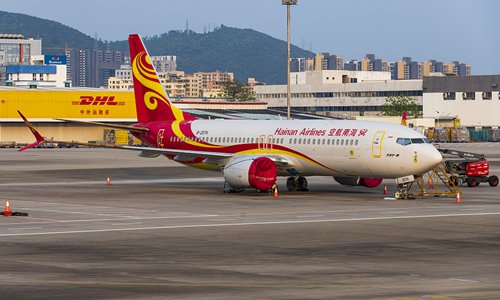HOME >> BUSINESS
Airlines put heat on Boeing
By Tu Lei Source:Global Times Published: 2019/5/22 20:58:39
Compensation demands add pressure to US giant

Photo: VCG
Major Chinese airlines on Wednesday took what appears to be a concerted effort to demand compensation from US aircraft manufacturer Boeing for the losses they suffered for grounding the flawed Boeing 737 MAX aircraft after two deadly crashes.
Coming at a time when the US has escalated its trade and technology battle with China by targeting more Chinese tech firms, the move by Chinese airlines could be an indication that Chinese authorities might put pressure on US corporations like Boeing in retaliation for US actions, said Chinese analysts.
Air China, China Southern Airlines and Xiamen Airlines announced Wednesday that they have formally asked Boeing for compensation for losses caused by grounding their 737 MAX planes, media reported.
The three airlines followed similar steps taken by China Eastern Airlines on Tuesday, which became the first Chinese airline to seek compensation from Boeing. In a statement to the Global Times on Tuesday, China Eastern said it has endured "relatively huge" losses, which are continuing to snowball.
Since Chinese authorities ordered airlines to ground the Boeing 737 MAX jets over safety risks on March 11, a dozen Chinese airlines have grounded a total of 96 jets. Air China grounded 15, China Southern grounded 24 and China Eastern grounded 14.
Days after the crash of Ethiopian Airlines Flight 302 in March, Norwegian Air became the first airline to publicly demand compensation for the grounding of the 737 MAX from Boeing.
Pressure on Boeing
The compensation claims by Chinese airlines would also help put huge pressure on Boeing, which could face billions of dollars in losses, according to analysts and industry data.
One insider said that the cost of grounding a Boeing 737 MAX each month could reach as high as 10 million yuan ($1.45 million), though the insider said the exact cost would be hard to calculate considering the different factors involved.
For airlines, the impact of grounding is not only a loss in flight operations caused by the replacement model, but also a cost in aircraft suspension, according to Diao Weimin, an international aviation lawyer based in Beijing.
Also, if the aircraft is parked for more than three months, it must be sealed, which would increase costs, and the cost of plane leasing is also very high, as some airlines will choose to lease the airplanes instead of buying directly, Diao told the Global Times on Wednesday.
The cost of grounding all 737 MAX planes globally for three months could reach between $1 billion and $5 billion, according to estimates from Melius Research and Jefferies.
Boeing declined to comment on Wednesday, telling the Global Times that "we don't discuss our conversations with customers."
Response to US
Industry insiders said that other Chinese airlines could soon take similar steps, especially as the China-US trade war continues to escalate, with US officials constantly raising the stakes by going after Chinese companies.
One insider, who spoke on condition of anonymity, said that the timing of the demand for compensation from Chinese airlines might have been well planned.
"If the trade talks did not go sour, I don't think they would seek compensation this early," the insider told the Global Times on Tuesday.
The US has moved to bar Chinese tech firm Huawei from accessing US components, and US officials were reportedly considering blacklisting as many as five Chinese surveillance equipment providers. That could leave China with no other option but to strike back by putting pressure on big US companies that rely on the Chinese market, analysts said.
"China seems to be ready to put more pressure on Boeing as the company happens to have a genuine safety issue, and the trade friction between the US and China has spiraled downward," Shen Yuxin, a partner at the law firm Freshfields Bruckhaus Deringer, told the Global Times on Wednesday.
Analysts pointed out that given the massive orders Chinese airlines have with Boeing, it would be hard to cut ties with the US firm, but there are many ways to exert pressure, such as reducing or stopping new orders.